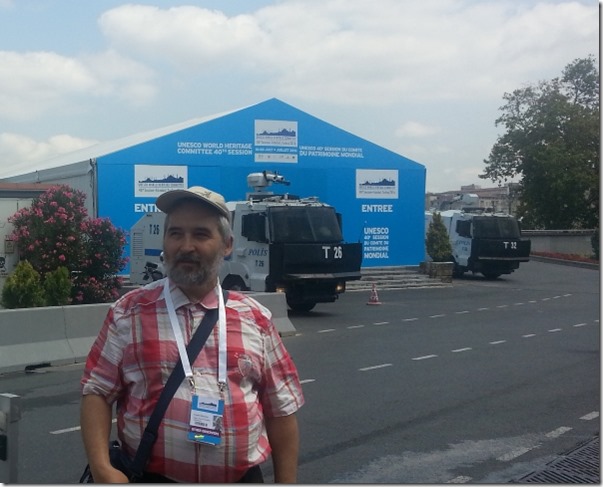The 40th session of the WHC held in Istanbul ended prematurely due to unsuccessful coup in Turkey. Nevertheless it adopted a powerful Decision on safeguarding the Lake Baikal World Heritage Site against negative impacts both in Russia and in Mongolia. Despite attempts of Mongolian delegation, that included the Director of the World Bank MINIS Project Mr.. Enkhbaatar and 9 more officials, to soften the language of the decision, the committee adopted it as drafted and posted on web-site by the World Heritage Center. Since nothing has been done by Mongolia to implement decisions taken by the previous 39th WHC Session, the decision reiterates the same requests regarding planned dam building:
(Committee) Further regrets that the State Party of Mongolia did not provide updated information on the implementation of other recommendations of the 2015 Reactive Monitoring mission, and also reiterates its requests to the State Party of Mongolia to:
|
a) Ensure that the EIA developed for the Egiin Gol Project includes assessment of potential impacts not only on the hydrology, but also on the ecological processes and biodiversity of the property, and specifically on its OUV, and to provide the full EIA report to the World Heritage Centre, b) Ensure that the Terms of Reference developed for the preparation of EIAs for the Shuren Hydropower Plant and the Orkhon River projects include a specific assessment of any potential impacts of the projects on the OUV and integrity of the property, c) Provide to the World Heritage Centre the EIAs for the Shuren Hydropower Plant and Orkhon river reservoir complex, d) Develop an assessment of cumulative impacts of any planned dams and reservoirs in the Selenge river basin that may have an impact on the OUV and integrity of the property and to provide this assessment to the World Heritage Centre, e) Not approve any of the projects until the above-mentioned EIAs and assessment of cumulative impacts have been reviewed by the World Heritage Centre and IUCN; 1. Further reiterates its request to the States Parties of the Russian Federation and Mongolia to jointly develop a SEA for any future hydropower and water management projects which could potentially affect the property, taking into account any existing and planned projects on the territory of both countries; 2. Further requests the State Party to submit to the World Heritage Centre, by 1 February 2017, an updated report on the state of conservation of the property and the implementation of the above, for examination by the World Heritage Committee at its 41st session in 2017. |
As for Russia, the Decision is much more detailed than last year due to demonstrated inability to manage Lake Baikal water resources in a way not harming its ecosystems:
|
It is regrettable that the State Party did not provide any information on the existing provisions and regulations for water use and management in Lake Baikal, as was requested by the Committee in its Decision 39 COM 7B.22. It should be noted that draft Resolution of the Government of the Russian Federation “On maximum and minimum water level of Lake Baikal” has recently been prepared and is available on the Federal portal for draft federal regulations and laws. However, the State Party does not provide any information on this legal document which, if adopted, would provide for fluctuations of the water level of the lake within a wider range than currently allowed and would therefore have clear implications for the management and protection of the property and have the potential to directly impact on its OUV. It is recommended that the World Heritage Committee urge the State Party to submit to the World Heritage Centre for review by IUCN detailed information on the current status of the proposed legislation, as well as the assessment that was used to define the proposed water levels and a detailed assessment of their potential impacts on the OUV of the property, including on its freshwater ecosystems and biodiversity, in line with IUCN’s World Heritage Advice Note on Environmental Assessment, and not to approve the legislation until these assessments have been reviewed by IUCN. |
Despite this request by WHC (published on June 10) Russian government on July 1 formally issued that Resolution of the Government of the Russian Federation “On maximum and minimum water level of Lake Baikal” , although limiting its effectiveness by 2016-17.
Committee Decision :
|
9. Further notes with concern the recent scientific information about alarming ecological changes in Lake Baikal, including algae and cyanobacteria blooms, and also requests the State Party to develop a property-wide ecological monitoring system in order to identify the causes of such changes and the responses required to preserve the ecological integrity of the Lake; |
10.Also regrets that the State Party did not provide any information on the existing provisions and regulations for water use and management in Lake Baikal, as was requested in its Decision 39 COM 7B.22 in line with the recommendation of the 2015 Reactive Monitoring mission, notes furthermore with concern that a draft Resolution of the Government of the Russian Federation “On maximum and minimum water level of Lake Baikal" has recently been prepared which, if adopted, could have implications for the management and protection of the property and could have potential direct impacts on its OUV, and urges furthermore the State Party to submit to the World Heritage Centre detailed information on the current status of the proposed legislation, as well as the assessment that was used to define the proposed water levels, including an assessment of potential impacts on the OUV of the property, including on its freshwater ecosystem and biodiversity, in line with IUCN’s World Heritage Advice Note on Environmental Assessment, and not to approve the legislation until these assessments have been reviewed by IUCN
The only State Party that partly fulfilled the decisions of the WHC Session was China.
Last year the WHC asked parties involved not to approve projects of new dam projects until all assessments are finalized and discussed with the WHC. By now both Russia and Mongolia received official confirmation that China Exim Bank has frozen its 1 billion USD loan to Mongolia aimed to support construction of Egiin Gol Hydro until assessments are made and bilateral consensus achieved.
The RwB representatives wholeheartedly thanked China’s Delegation at the WHC Session for presenting an example of following the Convention’s decisions and safeguarding the Lake Baikal.
Eugene Simonov
Istanbul



